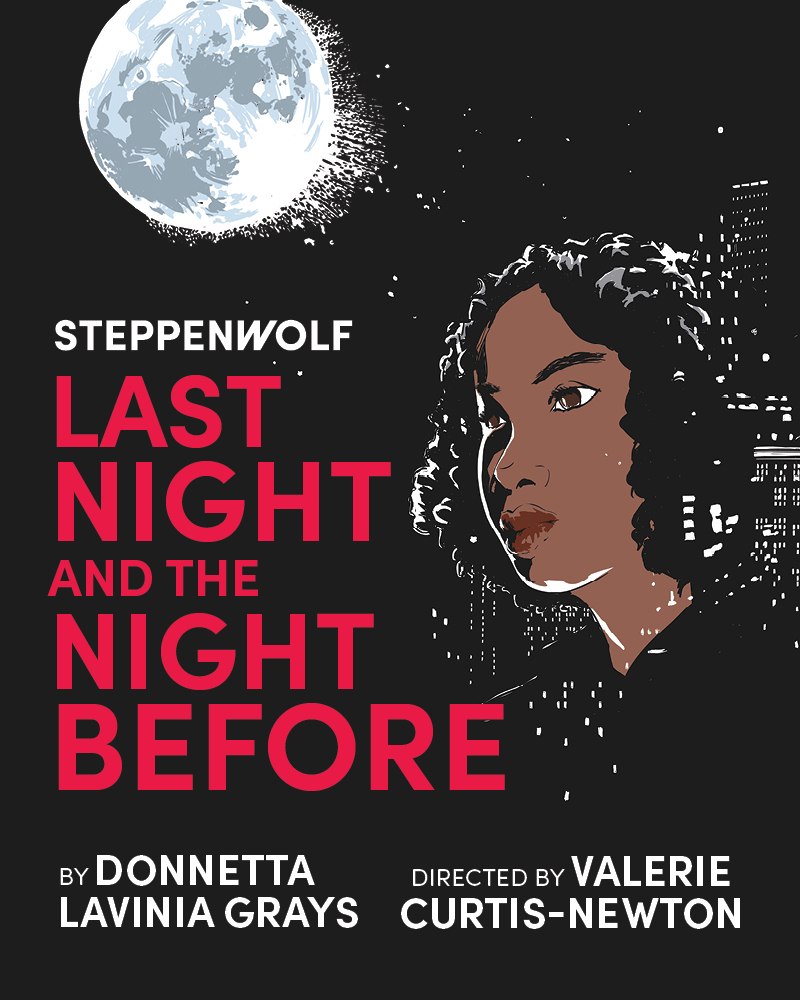
Last Night and the Night Before is one of these plays. It is gripping, gutting, delicate, hopeful, and not without a sense of humor. Donnetta Lavinia Grays weaves poetry, heartbreak and promise into a rich tapestry filled with textured characters living in complicated circumstances.
The relationships between these characters—broken, impossible, perfect—form the spine of the play. And the many incarnations of love manifested within these relationships form its soul.
The love between estranged sisters, bound by blood but separated by experience. The love between partners who know nearly everything about each other—yet still struggle to understand each other’s immutable selves. And, vitally, the love between parent and child: a sacred obligation that transcends all else.
This play explores the sacrifices that parents—both biological and chosen—are asked to make for the next generation. All in the name of love.
Welcome to Last Night and the Night Before. We hope that Valerie Curtis-Newton’s production, which bounds effortlessly back and forth between the disparate worlds of Brooklyn and rural Georgia, hits you in the gut, takes your breath away and ultimately fills your heart.
Artistic Directors
ON THE LANGUAGE
Playwright Donnetta Lavinia Grays
Maybe hand games were the first poems I ever learned. They immediately capture a moment in time when my imagination met my daring as a child. Hand games seem, to me, to be the percussive soundtrack of my invitation into womanhood. ‘Learn this,’ said my mother. ‘Remember this,’ said my sisters and my aunts.
Hand games were also a currency into community. Young Black girls sized each other up. Compared lyrics that evolved from neighborhood to neighborhood or along highways and river channels northbound from some central ancient rhythmic core. When you could play, when you could prove yourself, those same girls with familiar points of language let you know you belonged. And that your imagination and daring were welcomed inside of theirs.
Or, maybe the language I grew up speaking in the Southeastern United States was my entree into poetry. To me, there is no richer sound than the melodies in the voices of Southern Black folks. Those melodies hold the oral records of early Africa in America. Enslaved Africans set their stories of captivity inside a survivor’s rhythm and bore a language so sweet. One that demanded you take time with those underlying stories. That you sit a spell to hear them. And remember who you are.
We meet the Mcloud family as they remember who they are. And as they gift the youngest among them this language of survival. A language that guides her into womanhood. A language that breaks cycles of pain and turns them into hope. A language that lets Sam know that she is part of a storied legacy. And that she has a history worthy of celebration. That she is not the sum of her heartaches, but a nuanced and ever-evolving landscape of possibilities guided by love. She is poetry itself.
It is my hope that you join us on this journey of love through language. And, although some of it may hit the ear strangely, I ask that you simply allow it to. Because love isn’t easy. This play makes that argument over and over again. Love is action. Love is listening. And, yes, as hard as it is to do so sometimes… love is letting go.
STEPPENWOLF PRESENTS
LAST NIGHT AND THE NIGHT BEFORE
By Donnetta Lavinia Grays
Directed by Valerie Curtis-Newton‡
FEATURING
Ayanna Bria Bakari*, Sydney Charles*, Kylah Renee Jones, Aliyana Nicole, Namir Smallwood†* and Jessica Dean Turner*
CREATIVE TEAM
Regina García+ Scenic Design
Izumi Inaba+ Costume Design
Mary Louise Geiger+ Lighting Design
Larry Fowler+ Sound Design
Kirsten Baity Intimacy Choreographer
Maya Vinice Prentiss Fight Choreographer
Gigi Buffington Company Voice, Text & Dialect Coach
Tom Pearl Producing Director
JC Clementz, CSA Casting Director
Laura D. Glenn* Production Stage Manager
Jaclynn Joslin* Assistant Stage Manager
† member of the Steppenwolf Theatre Company ensemble.
* member of Actors’ Equity Association, the union of professional actors and stage managers.
+ member of United Scenic Artists, Local 829 of the IATSE.
‡ member of Stage Directors and Choreographers Society, a national theatrical labor union.
CAST
Ayanna Bria Bakari* Monique
Sydney Charles* Rachel
Kylah Renee Jones Sam
Aliyana Nicole Sam
Namir Smallwood†* Reggie
Jessica Dean Turner* Nadima
UNDERSTUDIES
Kaylah Marie Crosby Monique
Ajax Dontavius Reggie
Stephanie Mattos Rachel
Wren Nadima
ADDITIONAL STAFF
Ray Sanchez Hair & Wig Consultant
Alex Dauphin Assistant Director
Daniel Friedman Assistant Lighting Design
Lauren Peters Production Assistant
Amanda Blanco Young Performer Supervisor
Sebastian Van Horn Dresser
Lauren Casson COVID Safety Manager
Jeanette Rodriguez Costume Assistant
Melissa Wilson First Hand
Riley Sullivan Stitcher
Jessica Rodriguez Additional Costume Distressing
Jesse Debolt, Billy Earnisse, Kenny Faust, Tim Martin, John McTaggart, Bobby Noe, Carolyn Voss Additional Carpenters
Camille Toshiko-Peotter Additional Properties
Zhanna Albertini, Amy Couey, Livian Kennedy Additional Paint
This play runs 2 hours including a 15 minute intermission.
As a courtesy to the actors and your fellow patrons, please turn off your cell phones before the performance.
Entry and re-entry into the theater after the performance begins is not guaranteed.
The taking of photographs and the use of any type of recording device are not allowed in the theater during performances and is a violation of state and federal copyright laws; digital media will be deleted, and tape or film will be confiscated.